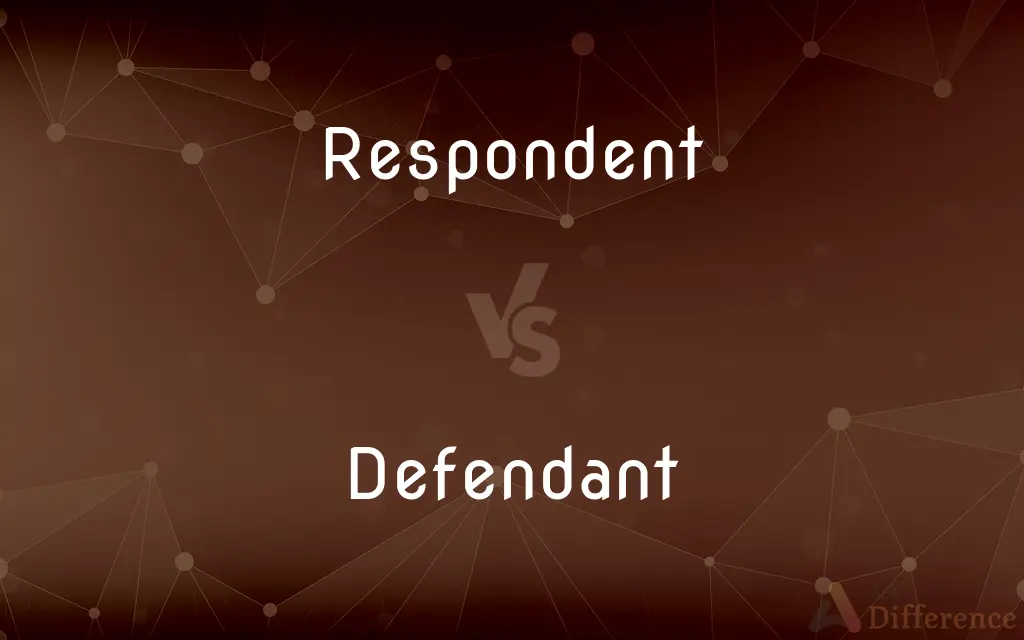Respondent vs. Defendant — What's the Difference?
Edited by Tayyaba Rehman — By Fiza Rafique — Updated on September 26, 2023
Respondent is a person who replies to something, especially in legal matters like an appeal, while a Defendant is an individual or entity accused in a court of law.

Difference Between Respondent and Defendant
Table of Contents
ADVERTISEMENT
Key Differences
Respondent and Defendant are both terms used in the legal field to refer to parties involved in cases, but they have distinct contexts and meanings. A Respondent is generally someone who responds or answers to a petition or motion. In contrast, a Defendant is specifically an individual, group, or entity that is being accused or charged in a lawsuit.
In many legal scenarios, the term Respondent is utilized in appellate courts. When an appeal is made, the person appealing is the appellant, and the one answering or responding to the appeal is the Respondent. The Defendant, on the other hand, is primarily seen in criminal and civil lawsuits where someone is facing accusations or charges. In these instances, the party bringing the charges is the plaintiff or prosecutor, and the accused is the Defendant.
It's essential to recognize that while every Defendant responds to the accusations or charges, not every Respondent is a Defendant. The term Respondent is broader and can be used in various legal scenarios, from administrative proceedings to certain family court matters. In contrast, the term Defendant is much more specific, pointing directly to someone accused of wrongdoing.
Comparison Chart
Legal Context
Used in appellate courts & various legal scenarios.
Primarily used in criminal and civil lawsuits.
Association
Responds to petitions, motions, or appeals.
Accused or charged in a lawsuit.
ADVERTISEMENT
Relation to Other Parties
Often paired with "appellant" in appellate cases.
Paired with "plaintiff" or "prosecutor" in civil or criminal cases, respectively.
General Definition
Someone who replies or responds.
Someone accused or sued in court.
Non-legal Usage
Can refer to someone answering a survey or questionnaire.
Retains its legal connotation.
Compare with Definitions
Respondent
Respondent can refer to someone responding in legal proceedings other than trials.
In the family court, the Respondent disagreed with the petitioner's claims.
Defendant
Defendant is an individual or entity accused in a court of law.
The Defendant pleaded not guilty to the charges.
Respondent
Respondent can be a party responding to a legal action.
The Respondent provided evidence to counter the accusations.
Defendant
Defendant is an individual who must defend against legal charges.
The jury was focused on the testimony of the Defendant.
Respondent
Respondent refers to someone who answers or replies to a petition or motion.
The Respondent filed a counter-argument in the appellate court.
Defendant
Defendant refers to someone sued or prosecuted for an alleged wrongdoing.
The evidence against the Defendant was circumstantial.
Respondent
Respondent, in non-legal contexts, is someone answering a survey or questionnaire.
The survey had over a thousand Respondents.
Defendant
Defendant is the party facing accusations in a lawsuit.
The Defendant's lawyer presented a robust defense.
Respondent
Respondent is an individual who replies to an appeal in court.
The judge heard the arguments of both the appellant and the Respondent.
Defendant
Defendant is the opposing party to the plaintiff in civil cases or the prosecutor in criminal cases.
The case was dismissed due to a lack of evidence against the Defendant.
Respondent
A respondent is a person who is called upon to issue a response to a communication made by another. The term is used in legal contexts, in survey methodology, and in psychological conditioning.
Defendant
In court proceedings, a defendant is a person who is the party either accused of committing a crime in criminal prosecution or against whom some type of civil relief is being sought in a civil case. Terminology varies from one jurisdiction to another.
Respondent
A party against whom a petition is filed, especially one in an appeal or a divorce case.
Defendant
The party against which an action is brought.
Respondent
A person who replies to something, especially one supplying information for a questionnaire or responding to an advertisement
Most respondents to our questionnaire considered their practices to be in accordance with current medical guidelines
Defendant
Serving, or suitable, for defense; defensive, defending.
Respondent
In the position of a party defending against a petition
The respondent defendant
Defendant
(legal) In civil proceedings, the party responding to the complaint; one who is sued and called upon to make satisfaction for a wrong complained of by another.
Respondent
Replying to something
The respondent firms in the survey
Defendant
(legal) In criminal proceedings, the accused.
Respondent
Involving or denoting a response, especially a conditioned reflex, to a specific stimulus.
Defendant
Serving, or suitable, for defense; defensive.
With men of courage and with means defendant.
Respondent
One who responds.
Defendant
Making defense.
Respondent
(Law) The defending party in certain legal proceedings, as in a case brought by petition.
Defendant
One who defends; a defender.
The rampiers and ditches which the defendants had cast up.
Respondent
Giving or given as an answer; responsive.
Defendant
A person required to make answer in an action or suit; - opposed to plaintiff.
Respondent
(Law) Of or being a respondent in a proceeding.
Defendant
A person or institution against whom an action is brought in a court of law; the person being sued or accused
Respondent
One who responds; one who replies.
Respondent
(law) A defendant, especially in a case instituted by a petition or in appellate and divorce proceedings.
Respondent
A person replying to a questionnaire.
Respondent
Disposed or expected to respond; answering; according; corresponding.
Respondent
Disposed or expected to respond; answering; according; corresponding.
Wealth respondent to payment and contributions.
Respondent
One who responds. It corresponds in general to defendant.
Respondent
The codefendant (especially in a divorce proceeding) who is accused of adultery with the corespondent
Respondent
Someone who responds
Respondent
Replying;
An answering glance
An answering smile
Common Curiosities
Outside the legal realm, what can a Respondent refer to?
A Respondent can refer to someone answering a survey or questionnaire.
Is every Defendant a Respondent?
While every Defendant responds to charges, not every Respondent is a Defendant.
In which court is the term Respondent commonly used?
The term Respondent is frequently used in appellate courts.
Who brings charges against a Defendant?
In civil cases, a plaintiff brings charges, while in criminal cases, a prosecutor does.
Is Respondent specific to criminal or civil cases?
No, the term Respondent can be used in various legal scenarios, including administrative and family court matters.
What is the primary distinction between Respondent and Defendant?
Respondent replies to legal matters like appeals; a Defendant is accused in court.
Is Defendant used outside of legal contexts?
The term Defendant predominantly retains its legal connotation.
What role does a Defendant play in a lawsuit?
A Defendant defends against accusations or charges brought in a lawsuit.
Who typically represents a Defendant in court?
A defense attorney or lawyer represents the Defendant.
Does a Respondent always oppose an appellant?
In appellate cases, yes; the Respondent opposes the appellant.
In which court cases is the term Defendant predominantly found?
The term Defendant is primarily found in criminal and civil lawsuits.
In appellate cases, who is the opposing party to the Respondent?
The opposing party is often the "appellant."
What is the relationship between a Defendant and a plaintiff?
In civil cases, the plaintiff accuses or sues the Defendant.
If someone answers a survey, can they be called a Respondent?
Yes, in non-legal contexts, someone answering a survey is often referred to as a Respondent.
Can the term Respondent be used interchangeably with Defendant?
No, while both can be involved in legal cases, their roles and contexts differ.
Share Your Discovery

Previous Comparison
Tone vs. Pitch
Next Comparison
Inhalation vs. ExhalationAuthor Spotlight
Written by
Fiza RafiqueFiza Rafique is a skilled content writer at AskDifference.com, where she meticulously refines and enhances written pieces. Drawing from her vast editorial expertise, Fiza ensures clarity, accuracy, and precision in every article. Passionate about language, she continually seeks to elevate the quality of content for readers worldwide.
Edited by
Tayyaba RehmanTayyaba Rehman is a distinguished writer, currently serving as a primary contributor to askdifference.com. As a researcher in semantics and etymology, Tayyaba's passion for the complexity of languages and their distinctions has found a perfect home on the platform. Tayyaba delves into the intricacies of language, distinguishing between commonly confused words and phrases, thereby providing clarity for readers worldwide.
















































